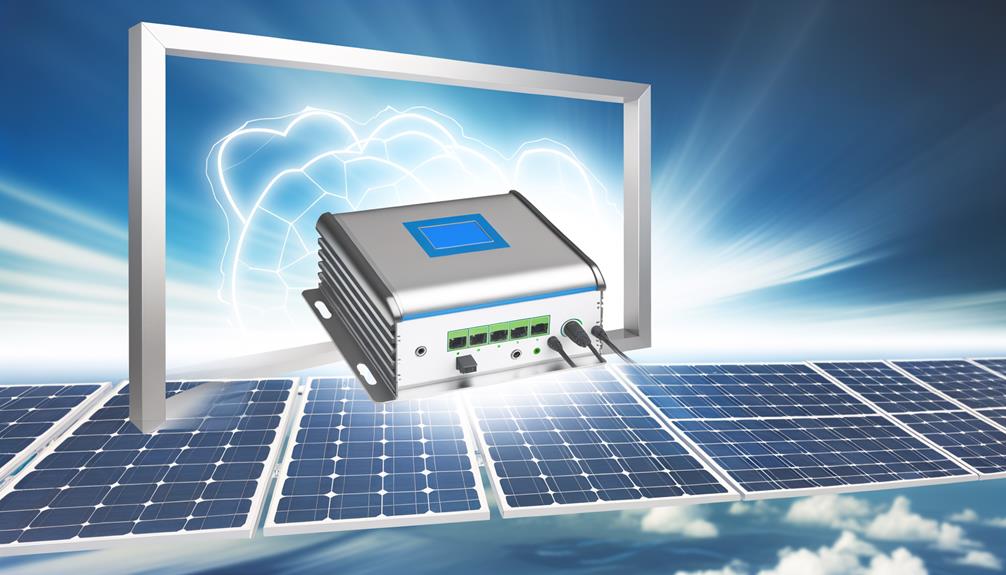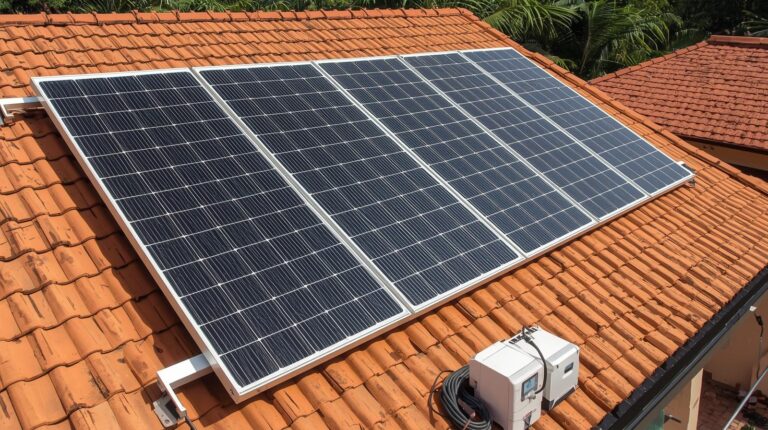Are you tired of dealing with unreliable solar charge controllers that fail to efficiently convert and regulate the power from your solar panels?
Imagine having a solar charge controller that not only maximizes the charging efficiency of your batteries but also offers advanced safety features and environmental sustainability.
In this discussion, we will explore the best solar charge controllers in the market, including their key features, performance, and value for money.
Whether you are an off-grid adventurer seeking a rugged controller for your RV or a homeowner looking to harness solar energy for your household needs, this exploration will provide you with the necessary insights to make an informed decision.
Get ready to take your solar power system to the next level!
Key Takeaways
- The efficiency and performance of MPPT controllers make them a better choice for larger solar systems and low light conditions.
- PWM controllers are more affordable and suitable for smaller systems.
- When choosing a solar charge controller, consider factors such as maximum current rating, voltage rating, warranty, and battery compatibility.
- Other important features to consider include easy installation, remote monitoring capabilities, load control functionality, temperature compensation, and safety features.
Best Solar Charge Controllers 2024 Reviews
Looking for the best solar charge controllers in 2024? Look no further. We’ve compiled a list of top contenders, including:
- Renogy 10 Amp 12V/24V PWM Negative Ground Solar Charge Controller
- ALLPOWERS 20A Solar Charger Controller
- Depvko Solar Charger Controller
- EEEkit 30A Solar Charge Controller
- Victron Energy SmartSolar MPPT 100V 30 amp 12/24-Volt Solar Charge Controller.
Read on to find the perfect controller for your solar power system.
Renogy 10 Amp 12V/24V PWM Negative Ground Solar Charge Controller
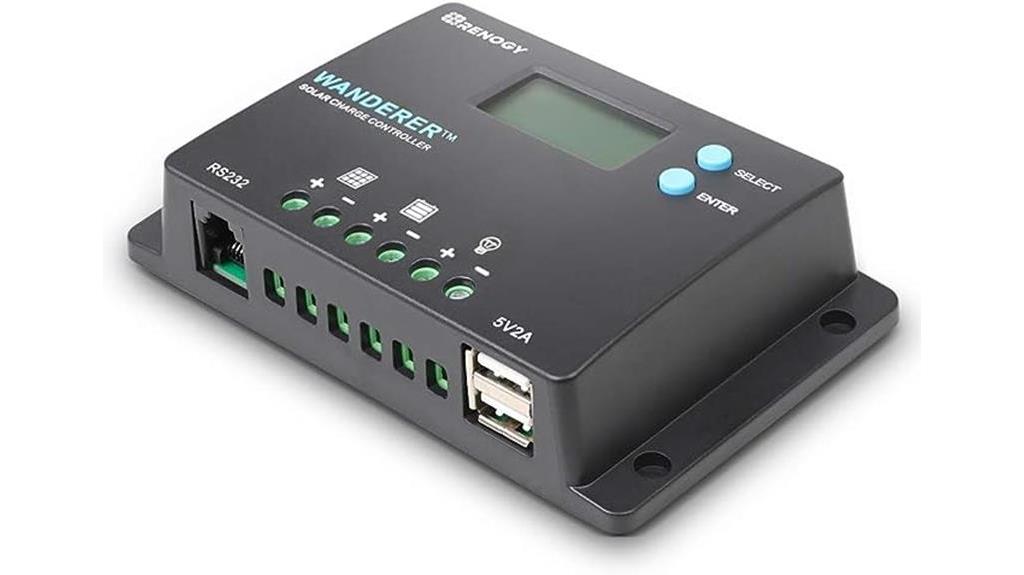
The Renogy 10 Amp 12V/24V PWM Negative Ground Solar Charge Controller is the ideal choice for those seeking a reliable and versatile solar charge controller. This charge controller automatically detects battery voltage and adjusts charging parameters accordingly. It also provides comprehensive protection for your solar system, ensuring its longevity and efficiency.
With multiple types of charging ports, including USB, you have the flexibility to charge various devices. The Renogy controller offers diverse load control modes, allowing you to customize the settings to suit your specific needs. Additionally, it has an extremely low self-consumption, ensuring that it won’t drain power unnecessarily. Real-time monitoring is made easy with the integrated RS232 port.
Users have reported that this charge controller works well for charging both large and small batteries. It’s also fairly durable, able to withstand drops and rain. However, it may struggle with 10 AWG wire and works better with 14 AWG. Some users have mentioned that the controller continuously cycles through display settings, which can be slightly inconvenient.
Nevertheless, the Renogy 10 Amp 12V/24V PWM Negative Ground Solar Charge Controller is praised for its easy setup and clear instructions. It has proven to be reliable on various remote projects without failures. In comparison to other controllers, Renogy is a leader in solar technology and this particular model is an economical option compared to cheap PWM controllers. It’s suitable for basic needs and modest solar energy collection. For larger projects, more sophisticated setups are available.
While there have been a few negative experiences, such as controller failure after a month of usage and terminals designed for smaller wire sizes, the overall positive experiences and recommendations outweigh the negatives. Many users have found this charge controller to be a good, small option with easy installation. It works well as a replacement for old controllers and offers fast delivery and a great kit. However, there have been a few customers who were unsatisfied due to USB output issues.
Best For: Those in need of a reliable and versatile solar charge controller for basic solar energy collection.
Pros:
- Automatically detects battery voltage and adjusts charging parameters
- Provides comprehensive protection for solar system
- Multiple types of charging ports, including USB
Cons:
- Controller may fail after a month of usage
ALLPOWERS 20A Solar Charger Controller
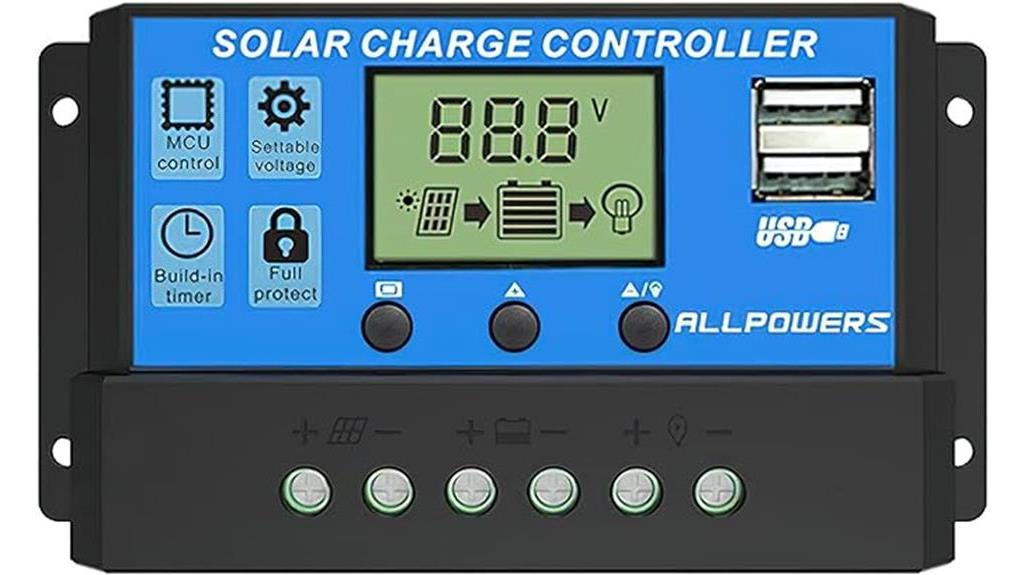
For those seeking a reliable and affordable solar charge controller, the ALLPOWERS 20A Solar Charger Controller offers a range of features and functionalities suitable for home, industrial, and commercial use.
This controller is equipped with an industrial-grade STM 8 microprocessor, providing reliable battery charge and discharge period management. It also has adjustable power rate with dual USB ports, allowing you to conveniently charge your devices.
The controller features a 3-stage charge management system (Bulk, ABS, Float) and a 4-stage PWM charge, ensuring efficient and effective charging of your batteries. It offers protection against over-current, short-circuit, inverse connection, low voltage, and overcharge.
The easy-to-use display provides status and data indication, making it user-friendly. With positive customer reviews and support experience, the ALLPOWERS 20A Solar Charger Controller is a cost-effective choice for your solar charging needs.
Best For: Those looking for an affordable and reliable solar charge controller for home, industrial, and commercial use.
Pros:
- Equipped with an industrial-grade STM 8 microprocessor for reliable battery charge and discharge management.
- Adjustable power rate with dual USB ports for convenient device charging.
- 3-stage charge management system and 4-stage PWM charge for efficient battery charging.
Cons:
- Uses PWM technology instead of MPPT, which may result in lower efficiency.
Depvko Solar Charger Controller
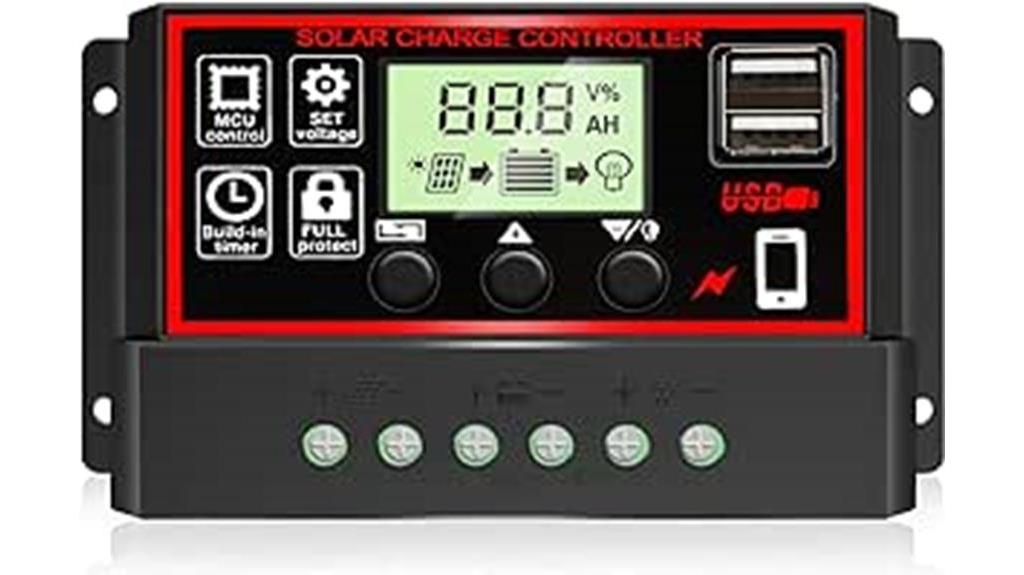
Ideal for those seeking a reliable and efficient solution, the Depvko Solar Charger Controller stands out as the best choice for managing solar panels and maximizing battery performance.
This upgraded 30A solar charge controller is compatible with both 12V and 24V systems, making it versatile for various applications.
With its dual USB output, you can conveniently charge your devices.
The LCD display provides clear status and data information, ensuring easy monitoring.
The controller offers various protection features, including overcurrent, short-circuit, inverse connection, low voltage, and overcharge protection, ensuring safe use.
Its industrial microcontroller ensures automatic management of solar panels and battery, improving system efficiency and prolonging battery lifespan.
The Depvko Solar Charger Controller boasts a sleek design, easy setup, and installation process.
It has received positive customer reviews and ratings, validating its performance and reliability.
Best For: Those who want a reliable and efficient solution for managing solar panels and maximizing battery performance.
Pros:
- Compatible with both 12V and 24V systems
- Dual USB output for charging devices
- Various protection features for safe use
Cons:
- Unclear instructions and confusing icons
EEEkit 30A Solar Charge Controller
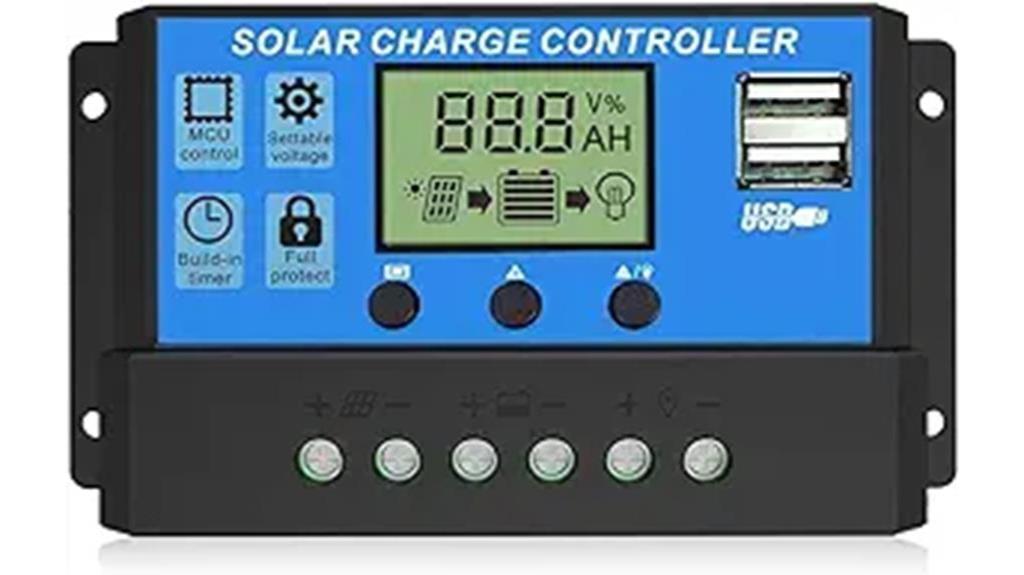
An excellent choice for those seeking a reliable and user-friendly solar charge controller is the EEEkit 30A Solar Charge Controller.
This controller is compatible with both 12V and 24V systems, making it versatile for various setups. It supports lead-acid batteries such as OPEN, AGM, and GEL, ensuring compatibility with different battery types. The controller features dual USB 5V/3A output ports, allowing you to charge your mobile devices conveniently.
It provides reliable protection for your devices and has an intelligent design with automatic management, ensuring optimal performance. The functional LCD display makes monitoring your system easy, and the controller is simple to use with its one-button operation.
With its compact dimensions and lightweight design, the EEEkit 30A Solar Charge Controller is a practical choice for small-scale setups. However, it may not be suitable for larger arrays and batteries. It’s an affordable option for development purposes and comes with a 30-day money-back guarantee and a 12-month warranty for quality-related issues.
Best For: Small-scale solar setups and users looking for an affordable option for development purposes.
Pros:
- Easy installation and user-friendly operation
- Reliable and accurate battery status indication
- Dual USB ports for convenient charging of mobile devices
Cons:
- Lack of instructions and incomplete manual
Victron Energy SmartSolar MPPT 100V 30 amp 12/24-Volt Solar Charge Controller
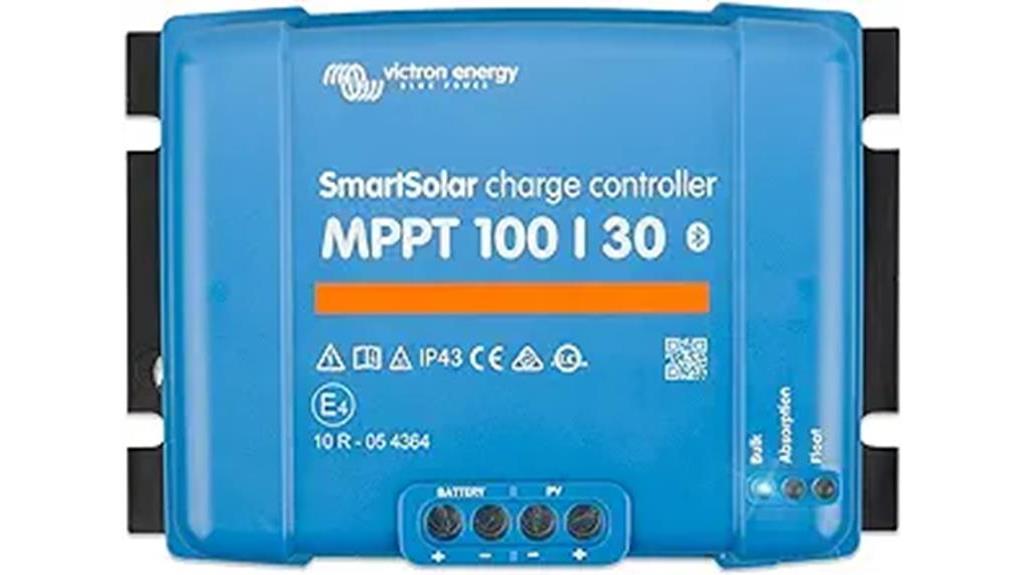
When searching for the best solar charge controller, one standout option is the Victron Energy SmartSolar MPPT 100V 30 amp 12/24-Volt Solar Charge Controller. This charge controller utilizes a multi-stage, adaptive charging algorithm to maximize energy-harvest from solar panels and can even recharge severely depleted batteries from 0 volts. With Victron Energy’s MPPT technology, you can expect efficient energy collection and utilization.
One notable feature of this controller is the built-in Bluetooth capability, allowing for wireless monitoring and control. User reviews and testimonials have praised the Victron Energy SmartSolar MPPT charge controller for its industrial quality, good application support, efficient charging algorithm, and comprehensive data and graphs. However, it’s worth noting that this controller doesn’t have a built-in display, and there have been occasional app glitches and limited data display.
Overall, if you’re looking for a solar charge controller with advanced features and wireless monitoring capabilities, the Victron Energy SmartSolar MPPT 100V 30 amp 12/24-Volt Solar Charge Controller is a recommended choice.
Best For: Users who prioritize efficient energy collection and wireless monitoring capabilities in a solar charge controller.
Pros:
- Industrial quality
- Good application support
- Efficient charging algorithm
- Good data and graphs
Cons:
- No built-in display
SUNYIMA 60A MPPT Solar Charge Controller
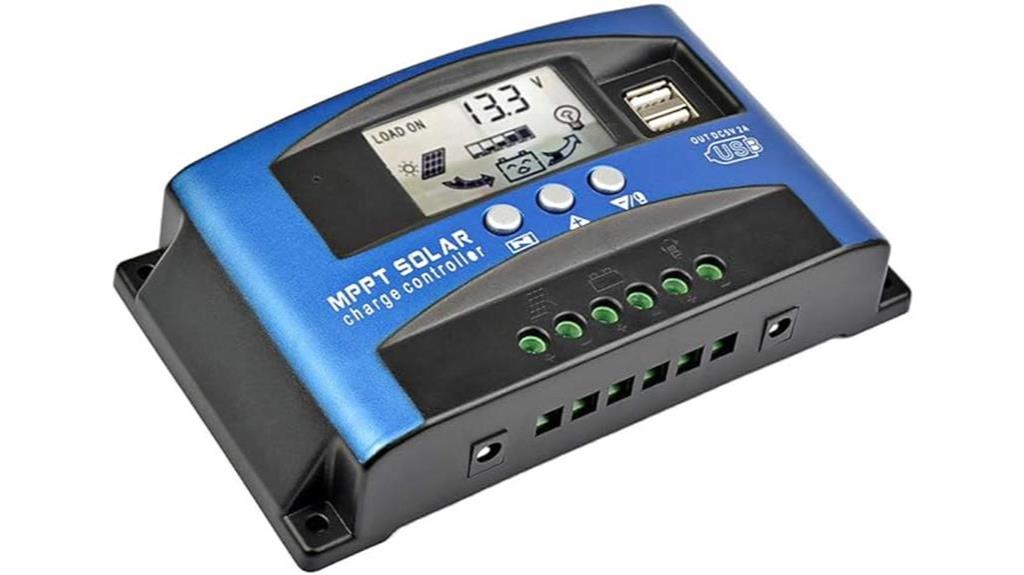
For those seeking a reliable and efficient solar charge controller, the SUNYIMA 60A MPPT Solar Charge Controller stands out with its innovative MPPT technology and high tracking efficiency. With its dual USB ports and multiple load control modes, this controller offers convenience and versatility. The new MPPT technical feature ensures maximum charging current of 60A, while the industrial-grade master chip and 16AD sampling accuracy deliver accurate real-time display of temperature charging current and discharge current.
The multi-function LCD displays provide comprehensive information, and the controller automatically adapts to 12V or 24V systems. Additionally, the SUNYIMA 60A MPPT Solar Charge Controller offers reliable protection against overvoltage, short circuit, overload, overcharge, and over discharge. The automatic focusing MPPT tracking charging and bidirectional focusing tracking further enhance its performance.
Installation is simple, requiring the battery to be connected first and then the solar panel. Overall, this controller provides a reliable and efficient solution for your solar charging needs.
Best For: Users in need of a reliable and efficient solar charge controller with advanced features and protection mechanisms.
Pros:
- Innovative MPPT technology with high tracking efficiency
- Dual USB ports and multiple load control modes for convenience
- Comprehensive LCD displays and accurate real-time monitoring
Cons:
- Some confusion with instructions and menu items reported by users
Essential Factors to Consider Before Buying
Before buying a solar charge controller, there are a few essential factors you need to consider.
First, you should look at the maximum current rating of the controller to ensure it can handle the load of your solar panels.
Additionally, check the voltage rating to make sure it’s compatible with your system.
Lastly, don’t forget to check the warranty offered by the manufacturer for added peace of mind.
Maximum Current
To ensure optimal performance and compatibility with your solar power system, it’s crucial to carefully consider the maximum current capacity of a solar charge controller before making a purchase.
The maximum current refers to the highest amount of electric current that the charge controller can handle. It’s important to choose a charge controller with an appropriate current rating for your specific system. This ensures that the controller can effectively handle the current generated by your solar panels without overloading or damaging the system.
Additionally, a charge controller with overcurrent protection features can prevent any potential damage caused by excessive current. Load balancing, current monitoring, and current limiting are other important functions that a charge controller with a high maximum current can provide.
Therefore, when selecting a solar charge controller, make sure to consider the maximum current capacity to ensure efficient and safe operation of your solar power system.
Voltage Rating
Considering the importance of the maximum current capacity, the next essential factor to consider before buying a solar charge controller is its voltage rating.
The voltage rating of a solar charge controller refers to the maximum voltage it can handle from the solar panels. It’s crucial to choose a controller with a voltage rating that matches the voltage of your solar panel system.
The voltage rating plays a vital role in ensuring the stability of the system. It helps regulate the voltage output from the solar panels and protects the batteries from overvoltage or undervoltage conditions. Overvoltage protection prevents any damage to the batteries caused by excessive voltage, while undervoltage protection safeguards against battery undercharging.
Furthermore, a solar charge controller with good voltage regulation capabilities ensures that the batteries receive a consistent and stable voltage for optimal charging and performance. This helps prevent voltage fluctuations, which can negatively impact the battery life and overall system efficiency.
Therefore, it’s essential to consider the voltage rating of a solar charge controller to ensure the proper functioning and longevity of your solar power system.
Warranty
When purchasing a solar charge controller, it’s crucial to consider the warranty provided. Warranty coverage is an essential factor to assess before making your purchase. Look for a warranty that offers comprehensive coverage for a reasonable period, typically ranging from 1 to 5 years.
It’s also important to understand the claim process in case you encounter any issues with your charge controller. Some manufacturers may offer extended warranty options for an additional cost, providing you with added peace of mind.
Another aspect to consider is warranty transferability, which allows you to transfer the warranty to a new owner if you decide to sell your charge controller.
Lastly, be aware of any warranty exclusions that may limit the coverage, such as damage caused by improper installation or natural disasters. Taking the time to review and understand the warranty terms and conditions will help ensure a smooth and hassle-free experience with your solar charge controller.
Best Solar Charge Controller Buying Guide
When it comes to buying the best solar charge controller, there are several key points to consider.
Understanding the different types of solar charge controllers, such as PWM and MPPT, is essential in making the right choice.
You should also pay attention to important features like efficiency, voltage drop, and selecting the appropriate size for your system.
Understanding Solar Charge Controllers
To gain a comprehensive understanding of solar charge controllers and make an informed buying decision, it’s important to delve into their functionality and key features.
When it comes to sizing requirements, it’s crucial to choose a charge controller that can handle the maximum current and voltage produced by your solar panels.
Additionally, battery compatibility is essential to ensure that the charge controller can properly charge and maintain your specific battery type.
Load control is another important feature to consider, as it allows you to connect and control the power output to your load devices.
For those who desire remote monitoring capabilities, selecting a charge controller with this feature will provide you with real-time information on your system’s performance.
Lastly, it’s crucial to follow proper installation tips to ensure the optimal functioning and longevity of your solar charge controller.
Key Controller Features
Looking for the best solar charge controller? Let’s explore the key features you should consider before making your purchase.
First, consider the installation process. Look for a controller that’s easy to install, with clear instructions and minimal wiring requirements. This will save you time and effort during setup.
Next, check for remote monitoring capabilities. Some controllers allow you to monitor and control your solar system remotely, using a smartphone app or a computer. This feature provides convenience and allows you to keep an eye on your system’s performance from anywhere.
Battery compatibility is another important factor to consider. Ensure that the controller is compatible with the type and voltage of your battery. This will ensure optimal charging and prevent damage to the battery.
Load control functionality allows you to connect and control various loads, such as lights or appliances. Look for a controller that offers load control capabilities, as this will give you more flexibility in managing your energy usage.
Lastly, temperature compensation is crucial for efficient charging. A controller with temperature compensation adjusts the charging voltage based on the temperature, ensuring that your batteries are charged correctly regardless of the weather conditions.
PWM Vs MPPT Controllers
For those in search of the best solar charge controller, understanding the differences between PWM and MPPT controllers is essential.
When it comes to efficiency comparison, MPPT controllers have a clear advantage. They’re more efficient in converting solar energy into usable electricity, resulting in higher charging rates and improved overall system performance.
In terms of cost effectiveness analysis, PWM controllers tend to be more affordable than MPPT controllers, making them a popular choice for smaller solar systems. However, MPPT controllers are worth the investment for larger systems due to their higher efficiency and ability to maximize power output.
Additionally, MPPT controllers outperform PWM controllers in low light conditions, ensuring optimal charging even during cloudy or overcast days.
Both types of controllers are compatible with different battery types, but MPPT controllers offer more flexibility in battery voltage compatibility.
Efficiency and Voltage Drop
If you’re considering the efficiency and voltage drop of a solar charge controller, it’s important to understand how these factors can impact the performance of your solar system.
Voltage regulation is a crucial aspect of solar charge controllers as it ensures that the battery is charged optimally and not overcharged, which can lead to damage.
A high-quality charge controller will have excellent power efficiency, meaning it can convert a larger percentage of the solar energy into usable electricity.
Additionally, temperature control is essential to prevent overheating of the controller and maintain its efficiency.
Advanced charging algorithms are also necessary to maximize the charging rate and extend battery life.
Lastly, system compatibility is crucial to ensure that the charge controller works seamlessly with your solar panels and battery.
Considering these factors will help you choose the most efficient charge controller for your solar system.
Choosing the Right Size
To choose the right size solar charge controller for your system, you need to consider various sizing considerations.
First, determine the maximum current and voltage rating of your solar panels and batteries. This information is crucial in selecting a charge controller that can handle the power generated by your panels and the charging requirements of your batteries.
Additionally, consider the system voltage and load capacity of your setup. The charge controller should be compatible with the voltage of your system and have enough capacity to handle the load.
It’s also important to check the battery type compatibility of the charge controller, as different battery types may require different charging profiles.
Lastly, consider the installation requirements, such as the physical size and mounting options of the charge controller.
Taking these factors into account will help you choose the right size solar charge controller for your needs.
Controller’s Quality Indicators
Now let’s explore the Controller’s Quality Indicators, essential factors to consider when purchasing the best solar charge controller for your system.
Quality assessment is crucial in determining the reliability and efficiency of a solar charge controller. Look for controllers that have undergone rigorous performance evaluation and durability testing to ensure they can withstand various environmental conditions.
Checking customer reviews allows you to gain insights from real users, helping you make an informed decision.
It’s also important to consider industry standards when choosing a solar charge controller. Look for controllers that comply with recognized standards and certifications to ensure their safety and effectiveness.
Price and Value Considerations
When considering price and value for your solar charge controller purchase, it’s essential to evaluate the controller’s features and capabilities to ensure it meets your system’s requirements and offers long-term performance.
Cost effectiveness is an important factor to consider. Compare the durability of different controllers to determine which one offers the best value for your money. Additionally, take into account the brand reputation of the controller manufacturer. A reputable brand often signifies a higher quality product.
Consider the installation requirements of the controller as well. A user-friendly controller that’s easy to install can save you time and effort.
Safety and Protection Features
Consider the safety and protection features of your solar charge controller to ensure the reliable and secure operation of your solar power system.
One important feature to look for is overcharge prevention, which helps protect your batteries from damage by regulating the charging process.
Temperature compensation is another essential feature that adjusts the charging voltage based on the temperature, ensuring optimal battery performance in varying weather conditions.
Reverse polarity protection safeguards your system by preventing damage caused by incorrect wiring connections.
Additionally, short circuit protection is crucial in preventing electrical damage and fire hazards in the event of a short circuit.
Lastly, lightning protection is vital to safeguard your solar charge controller and other components from power surges caused by lightning strikes.
Environmental Impact Assessment
To ensure you make an environmentally conscious choice when purchasing a solar charge controller, it’s important to conduct an environmental impact assessment. This assessment will help you understand the ecological benefits, resource conservation, carbon footprint reduction, biodiversity preservation, and sustainable development associated with the solar charge controller you’re considering.
By evaluating these factors, you can ensure that your purchase aligns with your values and contributes to a more sustainable future.
Solar charge controllers offer significant ecological benefits by harnessing clean and renewable energy from the sun. They help conserve resources by reducing the reliance on fossil fuels and minimizing the carbon footprint associated with electricity generation. Moreover, solar charge controllers support biodiversity preservation by reducing air and water pollution.
Maintenance and Troubleshooting
Ensure proper maintenance and troubleshoot any issues with your solar charge controller by following these comprehensive guidelines.
To keep your solar charge controller functioning optimally, it’s important to perform regular maintenance. Start by checking the connections and wires for any loose or corroded parts. Clean the controller’s surface and ensure that it’s free from dust and debris. Additionally, inspect the battery terminals for any signs of corrosion and clean them if necessary. It’s also essential to regularly monitor the voltage and current levels to ensure they’re within the recommended range.
When troubleshooting, common issues may include battery overcharging or undercharging, incorrect wiring, or a faulty controller. Troubleshooting techniques involve checking the settings, connections, and fuses.
Frequently Asked Questions
Can I Connect Multiple Solar Panels to a Single Solar Charge Controller?
Yes, you can connect multiple solar panels to a single charge controller. It’s important to ensure the charge controller is compatible with the panel configuration and can handle the maximum panel capacity for optimal system efficiency.
How Long Does a Solar Charge Controller Typically Last?
Solar charge controllers typically last 5-15 years, but factors like quality, usage, and environment can affect their lifespan. To extend it, regularly clean and inspect the controller, upgrade to a more advanced model if needed, and troubleshoot common issues.
Is It Necessary to Have a Display Screen on a Solar Charge Controller?
It’s not necessary to have a display screen on a solar charge controller, but it can be helpful for monitoring and controlling. Alternatives like smartphone apps or LED indicators are available. Display screens may slightly impact energy efficiency and cost. It’s ultimately up to your preference and experience.
Are All Solar Charge Controllers Compatible With Lithium-Ion Batteries?
Yes, not all solar charge controllers are compatible with lithium-ion batteries. It’s important to choose a controller that offers charging efficiency, battery protection, voltage compatibility, temperature control, and maximum power point tracking for optimal performance.
Can a Solar Charge Controller Be Used for Both Off-Grid and Grid-Tied Systems?
A solar charge controller can be used for both off-grid and grid-tied systems. It has advantages in off-grid setups by regulating battery charging, while in grid-tied setups, it helps manage excess power. Factors to consider include system size and voltage compatibility.
Conclusion
When choosing the best solar charge controller for your needs, it’s important to consider factors such as the maximum input voltage, charging efficiency, and protection features.
According to recent statistics, the global solar charge controller market is expected to reach a value of $2.9 billion by 2024, showcasing the increasing demand for renewable energy solutions.
By investing in a reliable solar charge controller, you can optimize the performance of your solar power system and contribute to a greener future.

